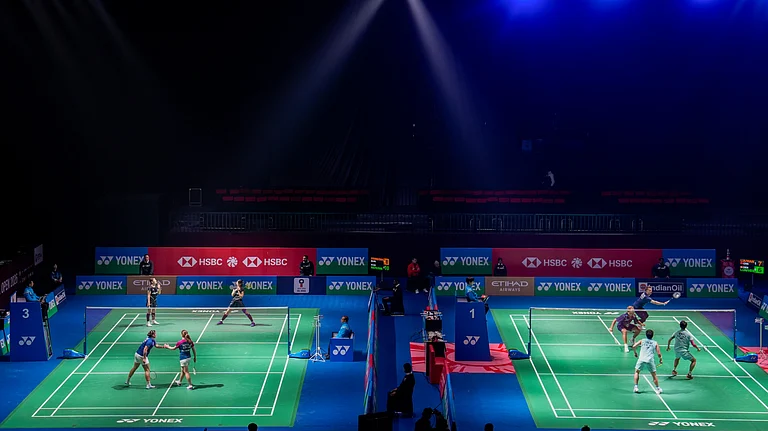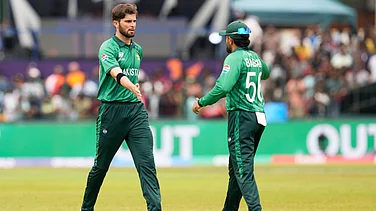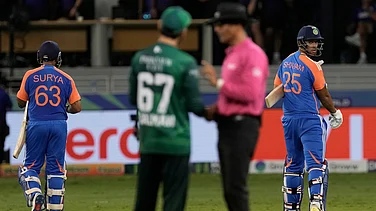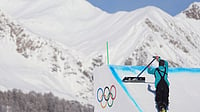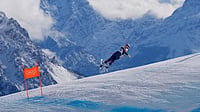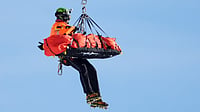The talk before the opening ceremony of the Paris Games ideally should be about its grandiose backdrop: a summer sun setting on the Seine River as athletes drift by in boats and wave to cheering crowds.
But behind the romantic veneer that Paris has long curated, mounting security concerns already have had an impact on the unprecedented open-air event. In January, the number of spectators allowed to attend the ceremony was slashed from around 600,000 to around 320,000.
Tourists were told they won't be allowed to watch it for free from riverbanks because the French government scaled back ambitions amid ongoing security threats. Then, on March 24, France raised its security readiness to the highest level after a deadly attack at a Russian concert hall and the Islamic State's claim of responsibility.
French President Emmanuel Macron says the ceremony could be shifted instead to the national stadium at Stade de France if the security threat is deemed too high.
Security and transportation are the biggest concerns heading into the Paris Games, which run from July 26-Aug. 11.
Here is an overview of preparations:
VENUES
The Olympic Village and the bio-based Aquatics Centre are in proximity to Stade de France. The 5,000-seat aquatics venue made predominantly of wood connects to the national stadium via a footbridge.
While the village and the aquatics centre in the poor, run-down area both leave a legacy for the future, the Games are steeped in history across the 35 venues.
Equestrian riders will gallop on the grounds of the royal Palace of Versailles.
B-boys and B-girls cutting improbable shapes, BMX freestylers launching into gravity-defying moves, skaters flipping boards and 3-on-3 basketball players facing off will provide a youthful vibe at an urban park at Place de la Concorde.
The Grand Palais hosts fencing and taekwondo, while the Yves-du-Manoir Stadium in the northwest suburb of Colombes is another link to the past: It was the main venue for the 1924 Paris Games. This time it holds field hockey matches.
The Parc des Princes football stadium, home to Paris Saint-Germain star Kylian Mbappe, is one of seven stadiums around the country hosting matches.
Beach volleyball takes place near the foot of the Eiffel Tower, while tennis, naturally, is at Roland Garros, home of the French Open. Roland Garros, where Rafael Nadal has made history with his record 14 Grand Slam titles at one tournament, also packs a punch as the venue for boxing.
Surfers won't be in Paris, however, but rather nearly 10,000 miles away in Teahupo'o, a coastal village in Tahiti, and they will sleep on a cruise ship docked at the French Polynesian island.
Breezy Marseille hosts the sailing events.
TICKET SALES
Around 9 million of the 10 million available tickets have been sold, organizers said, with 63% of buyers from France. The top 10-selling sports in order: football, track and field, basketball, rugby sevens, volleyball, handball, beach volleyball, field hockey, tennis and water polo.
The Paris Games' organizing committee will put an additional 250,000 tickets up for sale on April 17 to mark the 100 days to go.
Want to watch the BMX freestyle finals? Regular tickets are sold out.
SECURITY
Around 30,000 police officers are expected to be deployed each day, with 45,000 working the opening ceremony.
With its own resources stretched thin, France has asked 46 countries to help provide about 2,200 extra officers, many of whom will be armed. The French Defense Ministry also has asked foreign nations for a small number of military personnel, including sniffer dogs.
Tony Estanguet, the head of the Paris Games' organizing committee, said there will be unprecedented security measures.
“France has never deployed so many means for security,” he said. “I have faith that the security services in our country will make the Games safe.”
Cameras will be increased around the city, but facial recognition will not be used.
So far, 120 chiefs of state have confirmed they will attend the opening ceremony. Behind multiple security cordons, paying spectators will watch from the lower embankments while upper embankments are free for those with invitations.
An area around the Seine is expected to be closed to traffic a week before the parade and airspace will be closed on the night of the ceremony, France's Interior Minister Gérald Darmanin said.
TRANSPORTATION
Transport operators are gearing up to carry between 600,000 to 800,000 Olympic visitors per day. An ad campaign on billboards called “Anticipate the Games” directs people to a website instructing them how to lessen the impact.
Subway tickets will rise from €2.10 ($2.30) to €4 ($4.30) for a single ticket and a book of 10 tickets from €16.90 ($18.30) to €32 ($34.60).
But a newly extended Metro service on Line 14 is expected to be ready in June, carrying people from Paris' second airport, Orly, to an Olympic hub that includes the village, national stadium and aquatics centre.
ACCOMMODATIONS
The Olympic Village will house more than 14,000 athletes and officials, with apartments holding a maximum of eight people.
Fans and tourists, however, have been subjected to an increase in hotel and Airbnb prices.










